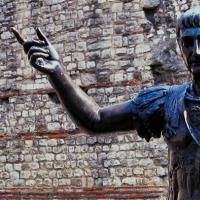Caliph Osman (644-656)
Osman was one of the first adherents of the founder of Islam, Muhammad, although he belonged to the same kind of Umayyads, because of the intrigues of which the prophet had to flee Mecca in 622. After this escape hijri) The Umayyads led the struggle of pagan Mecca against Muslim Medina, but later agreed to voluntarily submit to a man who had once been expelled from his native city by them.
The election of Osman as caliph after the assassination of Omar (644) was in many respects unfortunate. Osman began to squander state revenues in favor of his friends and relatives and patronize them to the detriment of the most deserving people. By his actions, from the very beginning, he pushed away his cousin and son-in-law Muhammad - Ali, as well as Talhu And Zubair who enjoyed great influence as the oldest companions of Muhammad and the richest persons in Medina. Osman was also very proud and offended all believers, treating them like a sovereign, which was especially sensitive for them after the feigned simplicity of the first caliph Abu Bakr and the true humility of the second caliph, Omar. Displeasure and unrest were soon to be found everywhere. Dissatisfied publicly reproached the third caliph in the mosque, and this even more aroused Osman to violence.
One of the oldest copies of the Quran, presumably compiled under Caliph Osman
These unrest, however, did not prevent the Arabs from continuing their conquests. Othman's relative, Umayyad Muawiyah, the son of Abu Sufyan, who was still the governor of Syria under Omar, conquered some cities of Asia Minor from the Greeks and forced the island of Cyprus, albeit not for long, to pay tribute to the Arabs. The Muslims spread their rule and religion along the shores of the Caspian and Black Seas; but on the other hand, due to internal unrest, they almost lost the countries they conquered in North Africa. Subsequently, however, they not only retained these lands, but also extended their dominance even further. Having become caliph, Osman summoned from Egypt the conqueror and governor of this country, Amr ibn al-As, and appointed his foster brother, Abdallah, in his place. When, shortly thereafter, the Greeks took possession of Alexandria by unexpected sabotage, Osman was forced to send Amr again to Egypt; but as soon as he drove them out of Egypt, he was again recalled, and Abdallah was again appointed in his place, who, however, turned out to be worthy of this appointment. He extended the borders of the state in northern Africa (648), conquered part of the land on the border of Libya and Tunisia, whose indigenous inhabitants, nomadic Berbers engaged in robbery, had previously been in close relations with Muslims. The Berbers, to whose descendants the Kabyles known in our time belong, were the same people who, under the names of Numidians or Mauritians, are so often mentioned in Roman history. In their way of life and customs, the Berbers had a great resemblance to the Arabian Bedouins, and, just as the latter, they hated all peoples who lived in cities and in permanent dwellings. These common features of the national character contributed to their rapprochement with the Arabs. When, in the reign of Omar, Amr, going with an army to Barka, came into conflict for the first time with some tribes of the Berbers, they sent ambassadors to him; whom he ordered to be sent to the caliph in Arabia. Omar and his entourage realized the importance of an alliance with the Berbers for the expansion of the state's borders. They affectionately received the ambassadors, and, applying to them one saying of the prophet, forced the Arabs to consider them as long-promised allies and their fellow tribesmen. When these ambassadors, answering a question from Omar, said that they were shepherds and hated settled life, he exclaimed that he now understood the words of the prophet, with which he consoled him during his grief over the slow spread of Islam: “Do not cry, Omar, God will grant us at last allies in one of the African peoples, which has neither cities, nor permanent dwellings, nor markets. Probably, the Arabs saw in the descendants of the Numidians fellow tribesmen of one of the peoples known to them, who lived near the Red Sea and resembled the Berbers in their name and customs, and therefore confused their names. At least, the name of the Berbers appears in Africa only from the time of its conquest by the Arabs. Subsequently, an alliance with the Berbers paved the way for the Muslims to the very Atlantic Ocean.

Borders of the Caliphate at the time of Osman's death (656)
Discontent against Osman continued to grow steadily, and finally led to open rebellion. The leaders of the dissatisfied gathered from various provinces in Medina to force the caliph to change the system of government. Their arrival placed Osman in an extremely difficult position; he tried with all his might to calm them, but he could only achieve this through the mediation of Ali. Osman expressed remorse and promised to fulfill everything that was demanded of him, but immediately after the departure of the leaders of the dissatisfied, he canceled all orders made at their request. Then the leaders of the opposition, led by the son of the former caliph Abu Bakr, Muhammad, returned to Medina, but this time accompanied by more than a thousand of the most energetic revolutionaries. Having penetrated into the city, they attacked the Caliph and his followers in the mosques, inflicted many wounds on him. Osman, stunned by the impact of the stone, was carried home unconscious. After that, the revolutionaries besieged the caliph in his home for several weeks in a row, at first not daring to kill him. Finally, perhaps out of fear that the governor of Syria and a member of the same kind of Umayyads, Muawiyah, would come with an army to defend him, the conspirators set fire to the dwelling of Caliph Osman, broke into it through a neighboring house, and killed an 82-year-old old man (656).
The dissatisfied proclaimed the cousin of the prophet Muhammad Ali caliph. Ali was not formally an accomplice in the murder of his predecessor, but, according to many signs, did not want to interfere with him, although he could have done it, thanks to his influence, when Osman was besieged in his house for three weeks.


